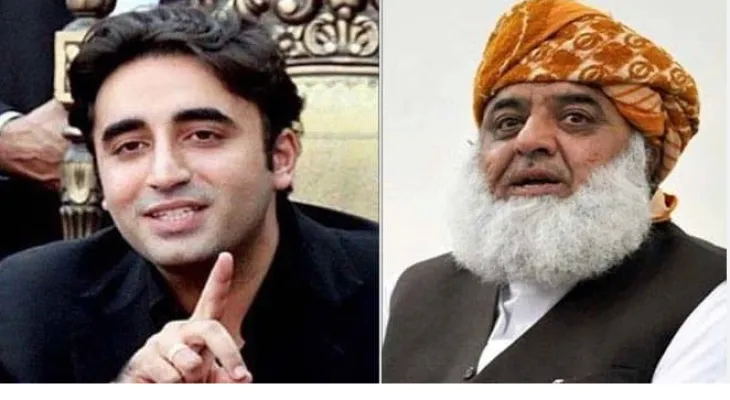JUI-F presents its draft on proposed constitutional amendment
ISLAMABAD ( WEB NEWS )
Special Parliamentary Committee Chairman Khursheed Shah chaired the committee session for debate and consensus of all political parties on the proposed constitutional amendment on Saturday.
The committee session concluded with the decision of forming a sub-committee and calling next session on Oct 17. Leaders of various political parties including PPP’s Raja Pervez Ashraf, Naveed Qamar, Sherry Rehman and PML-N’s Azam Nazir Tarar and Irfan Siddique participated in the meeting.
Barrister Gohar and Omar Ayub representing the PTI also attended the meeting while Asad Qaiser joined the meeting through video link. Ijazul Haq, Farooq Sattar, Aminul Haq National Party’s Jan Buledi also attended the session. The JUI-F presented its draft on the proposed amendment in the session.
However, JUI-F President Fazlur Rehman and PPP Chairman Bilawal Bhutto-Zardari didn’t join the committee session. The session on joint draft of PPP and JUI-F would be held in Zardari House. On Friday, the PPP presented its draft in committee’s session.
Meanwhile, the PTI didn’t present its draft on the amendment and decided to consider the government’s stance. The PTI received the JUI-F and PPP draft on the constitutional amendment.
Matters must be sorted out with dialogue and the opposition should give its suggestions as criticism wouldn’t resolve the issues, Minister Tarar said.
Speaking to media, he said negotiations under the constitutional framework were going on for a month and there was no unconstitutional clause in the amendment.
Quaid-e-Azam first proposed federal constitutional court in detail: Bilawal
A federal constitutional court was a vision of the Quaid-e-Azam who first gave the idea of that court, said PPP Chairman Bilawal. The PPP, he said, was following Quaid’s vision and also opposed the idea of granting powers to a specific court.
Bilawal Bhutto Zardari has said that Quaid-e-Azam first proposed the federal constitutional court in detail in the subcommittee on the federal structure at the Round Table Conference in London on Oct 27, 1931. It is almost identical to our proposal.
In a statement on X, Bilawal said he proposed three apex courts — the Federal Court for constitutional matters and enforcement of the citizen’s fundamental rights; the Supreme Court with appellate jurisdiction over the high courts and a Criminal Court of Appeal.
At the subcommittee, Jinnah said “any question that relates to the federal constitution or arises out of the federal constitution should vest in the Federal Court”. He also opposed the giving of a wide jurisdiction over “federal laws” to one court.
“I maintain that it should be open to any subject, if his right is invaded or attacked — relating to the constitution, of course, or arising out of the constitution — to go to the Federal Court direct”. With such a limitation, the Federal Court “will not be so overworked and, therefore, the cases can be expeditiously disposed of”.
There would be another advantage “if you separate your Federal Court, and if you will, in making the appointments, select the personnel of that court which will be specially qualified in matters arising out of the constitution, you will then, I think, set up a court which will be the most desirable court. We know, sir, that this is an age of specialists. In India, we have not yet risen to that height. You will be surprised to hear — and I think my friends here will bear me out … in the morning, you are arguing a complicated question of Hindu law, and in the afternoon, you are dealing with a case of light and air and easements, and perhaps the next day you are dealing with case of a commercial kind, and a third day, perhaps, you are dealing with a divorce action, and a fourth day you are dealing with an admiralty action.”
It was a solution to the courts being overburdened due to the vast jurisdiction conferred on them and was also very similar to the subsequent basic law of Germany (1949) which established the Federal Constitutional Court.
PPP’s Raja Pervez Ashraf stated that the amendment was not related to a specific person and matters were leading towards a positive direction. Ashraf hailed JUI-F’s decision to present a joint draft on the amendment.

